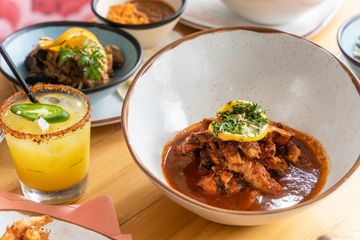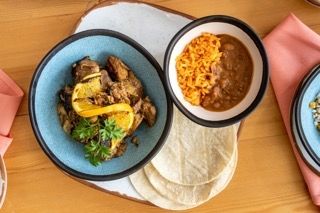Pair your meal with a perfectly mixed hand crafted margarita for a complete experience
Is Mexican Food Healthy And Balanced? Unloading the Nutritional Advantages of Standard Ingredients
The concern of whether Mexican food is healthy welcomes an expedition of its typical components. Beans and corn offer as foundational staples, abundant in protein and fiber. Avocados provide beneficial fats, while various natural herbs and seasonings add flavor and health and wellness benefits - mexican food. With each other, these components produce a tapestry of nutrition. The healthiness of Mexican food usually depends on preparation techniques and part dimensions. What role do these variables play in determining its overall nutritional value?
The Power of Beans: Protein and Fiber-Rich Staples
Often ignored, beans serve as a keystone of Mexican food, offering a wide range of nutritional advantages. Rich in healthy protein, they are an outstanding plant-based alternative for those looking for to fulfill their nutritional healthy protein requires. This high protein web content supports muscular tissue repair and growth, making beans vital for both meat-eaters and vegetarians alike. Furthermore, beans are an exceptional resource of dietary fiber, which assists in digestion and promotes a sensation of fullness, potentially helping with weight administration.
The selection of beans utilized in Mexican recipes, such as black beans, pinto beans, and kidney beans, contributes to a diverse taste account and can boost dishes nutritionally. Beans are low in fat and consist of necessary vitamins and minerals, including magnesium, folate, and iron. Together, these attributes make beans a crucial component, providing both nutrition and nutrition in typical Mexican price.

Corn: a Versatile Grain With Nutritional Advantages
Corn stands out as a versatile grain basic to Mexican food, celebrated not just for its cooking applications yet likewise for its outstanding nutritional account. As a primary active ingredient in recipes like tortillas, tamales, and pozole, corn offers necessary nutrients that add to a balanced diet. Rich in carbohydrates, it serves as a considerable power resource, while additionally being reduced in fat, making it a favorable option for numerous dietary requirements.
Corn is a great source of dietary fiber, which aids in digestion and advertises satiation. It includes substantial amounts of vitamins such as B-complex vitamins, which are crucial for power metabolic rate. The presence of anti-oxidants, especially carotenoids, adds to total wellness by reducing oxidative stress. Additionally, corn is gluten-free, accommodating those with gluten level of sensitivities. Generally, the dietary advantages of corn underscore its relevance in standard Mexican food and its duty in a healthy diet regimen.
Avocados: Healthy And Balanced Fats and Nutrients in Every Bite
Avocados play a substantial role in Mexican food, matching meals with their velvety structure and rich taste. Past their culinary allure, avocados are commemorated for their impressive dietary profile. They are an abundant resource of healthy and balanced monounsaturated fats, which can help lower negative cholesterol degrees and support heart wellness. Furthermore, avocados are loaded with necessary minerals and vitamins, including potassium, vitamin E, and B vitamins, adding to total wellness.
The high fiber material in avocados help food digestion and advertises satiation, making them a beneficial enhancement to any dish. Their distinct nutrient structure can likewise sustain skin wellness and offer anti-inflammatory benefits. Integrating avocados right into traditional Mexican meals or appreciating them as a standalone treat can boost both flavor and nourishment, demonstrating why they are a cherished staple in Mexican food. In general, avocados provide a scrumptious way to enjoy healthy fats and important nutrients in every bite.

Spices and Natural Herbs: Flavorful Wellness Boosters
While delighting in the rich tastes of Mexican food, one can not forget the vital duty that spices and herbs play in boosting both taste and wellness. Components such as oregano, chili, and cilantro peppers not just contribute to the dynamic flavor account but also offer substantial health and wellness benefits. Cilantro is understood for its detoxing homes, aiding to eliminate hefty steels from the body, while oregano is packed with anti-oxidants and has anti-inflammatory results.
Chili peppers, a staple in many Mexican dishes, have capsaicin, which has actually been linked to enhanced metabolic rate and pain relief. In addition, spices like cumin and coriander assistance food digestion and may aid in blood sugar level policy. Integrating these tasty health boosters right into meals not only improves the cooking experience yet additionally advertises overall well-being, making Mexican cuisine not simply scrumptious, yet additionally nutritionally useful.
Traditional Cooking Approaches: Enhancing Nutrition and Taste
Typical cooking methods in Mexican cuisine play a crucial duty in improving both nourishment and flavor, as they often focus on time-honored techniques and fresh active ingredients. Techniques such upscale restaurants near me as nixtamalization, where corn is soaked and cooked in an alkaline service, not only boost the nutrient profile of tortillas however also improve their digestibility - tacos. Furthermore, the use of slow-moving cooking techniques, like cooking or braising, permits tastes to blend beautifully while maintaining the stability of the ingredients

Frequently Asked Questions
Are Mexican Food Portions Typically Larger Than Various Other Cuisines?
Mexican food parts are frequently bigger than those of many other cuisines. This characteristic shows conventional dining practices, highlighting public sharing and hearty dishes, which can result in a much more substantial serving dimension overall.
How Does the Preparation Method Affect Healthiness of Mexican Food?
Preparation techniques significantly influence the healthfulness of Mexican food. Methods such as cooking or steaming maintain nutrients, while frying can raise harmful fat web content. Options of ingredients and cooking designs inevitably determine general nutritional worth.
Can Mexican Food Be Customized for Specific Nutritional Constraints?
Mexican food can certainly be customized for details dietary limitations. Alternatives, such as using corn tortillas for gluten-free diet regimens or incorporating even more vegetables, make it possible for individuals to delight in standard tastes while accommodating numerous dietary requirements.
What Prevail Misconceptions Regarding Mexican Food and Health?
Typical mistaken beliefs regarding Mexican food include the idea that it is naturally unhealthy, extremely hot, and only concentrated on fats. In truth, conventional dishes commonly feature healthy ingredients and can be customized to various dietary needs.
Are There Healthier Options at Mexican Dining Establishments?
Much healthier choices at Mexican dining establishments commonly consist of smoked meats, beans, and fresh vegetables. Choosing dishes that emphasize whole active ingredients and avoiding hefty sauces can cause a more nourishing dining experience, promoting overall wellness.
The variety of beans used in Mexican recipes, such as black beans, pinto beans, and kidney beans, adds to a varied taste account and can boost dishes nutritionally. Avocados play a considerable role in Mexican food, complementing meals with their luscious appearance and abundant taste. Integrating avocados into standard Mexican dishes or appreciating them as a standalone treat can boost both flavor and nourishment, showing why they are a beloved staple in Mexican food. While appreciating the rich flavors of Mexican cuisine, one can not neglect the essential role that spices and natural herbs play in enhancing both taste and health and wellness. Traditional cooking techniques in Mexican cuisine play a necessary function in improving both nourishment and flavor, as they click here for info often focus on fresh ingredients and classic techniques.